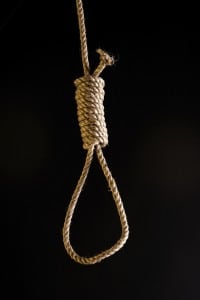
Why aren’t people on Death Row executed?
Every defendant who receives the death sentence is entitled to a number of appeals to ensure that justice was really done—but the process can take a very, very long time. The California Supreme Court will automatically review both the conviction of the crime, and whether the death sentence was appropriate.
There have also been a number of court cases debating whether the death penalty and lethal injection are “cruel and unusual punishment.” On top of that, the controversial death sentence is frequently the subject of voter referendums to repeal the penalty and replace it with life imprisonment. So California law has gone back and forth about whether the death penalty is actually legal or not.
Botched executions = cruel and unusual punishment
Currently, the death penalty is legal in California—but executions are not. Ten years ago, a federal court ordered all executions to be put on hold until the state established procedures that to ensure that an execution will be relatively quick and painless. Otherwise, it would be considered cruel and unusual punishment, which is illegal under the U.S. Constitution. When the court reviewed the process of lethal injection in 2006, it found that the execution team members were poorly trained and supervised, and they improperly mixed and administered the drug used for lethal injections at the time. There was a high risk that they might botch an execution and something could go horribly wrong. Now, finally, new procedures are currently under public review, but the approval process is slow.
What crimes are punished by death?
In the meantime, you can still be sentenced to death—even if you are more likely to die of natural causes than in the execution chamber. The crimes that are punishable by the death penalty (also called capital punishment) are known as capital crimes. In California, only treason and capital homicide are capital offenses.
Not every homicide is considered capital homicide. There are about twenty situations where if you intentionally kill someone, or someone dies as a result of your actions, you could be convicted of capital murder. These include:
- Killing during a kidnapping, rape, robbery, or carjacking
- Drive-by shootings or gang activity
- Killing a judge, witness, or police officer
- Murder for financial gain
- Killing multiple people at the same time
- Using a bomb or explosives
- Using torture or an especially cruel method.
In addition, you could receive the death penalty if you were previously convicted of first or second degree murder.
But even if you are convicted of one of the crimes above, you wouldn’t automatically face the death penalty. Just because the death penalty is an option for a capital crime does not mean that it is mandatory. The prosecution has to decide whether to seek the death penalty or not, before the case goes to trial. When the death penalty is sought, the whole trial process becomes more complicated and takes much longer. It also becomes much riskier for the prosecution when jurors have doubts about the death penalty. The prosecution might just decide to ask for LWOP instead—life without parole.
Fighting for your life?
If you or someone you know has been charged with a crime that could result in the death penalty, contact the Chambers Law Firm today. Dan E. Chambers has successfully worked on many high-profile cases, and he knows what it takes to defend even the toughest cases. Schedule your free case evaluation today by calling 714-760-4088, emailing dchambers@clfca.com, or sending an online message via the Chat box at the bottom right of this page.




